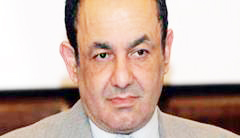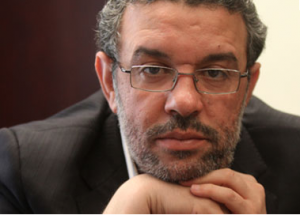In preparation for the upcoming parliamentary elections scheduled for April, several commentators sound unhappy that Islamists are intensifying efforts to mobilise voters, whereas the opposition powers are focusing on threats to boycott the elections and demonstrations. Many writers are calling upon secular groups to focus on the road ahead and take the occasion more seriously.
It is a big country
Amr Khafagy
Al-Shorouk newspaper
Khafagy expresses his disappointment from the way the country is being ruled by Morsi and his Islamist group. Egypt has always been a heavyweight country in the region. Even during the reigns of late presidents Gamal Abdel Nasser and Anwar Al-Sadat, the state had its own prestige and esteem. The situation today, according to Khafagy, is worse than that during Mubarak. At least during the dark 30 years of the ousted president, Egyptians were aware of their bleak situation and swimming in a wide ocean of corruption.
Khafay argues that Morsi is unaware of the actual influence that Egypt has over other countries and the extent to which it plays a significant role in the Middle East. The idea of having international entities monitoring our elections is unacceptable to Khafagy, who thinks that the country is not meagre to have foreign supervisors on our electoral process.
What happens today signifies that Egypt is not a large country and its resources are not appreciated by both its opposition and rulers. Whoever wants to rule this country has to know that Egyptians are, for a fact, some of the greatest people on the globe and that their state is one of the most significant, says Khafagy.
Mobilising in Tahrir, mobilising for the ballot boxes
Emad Al-Din Hussein
Al-Shorouk newspaper
As the parliamentary elections date was announced to be 22 April, Hussein criticises the secular and opposition political groups for not taking the occasion seriously. There are no bold efforts taken to mobilise voters towards the secular current, while the Islamists, mainly the Muslim Brotherhood, are intensifying their efforts, marking their plans and working on the grounds to attract even those in poor villages and slum areas.
The writer states that the opposition is merely concerned with the idea of demonstrations and freedom of expression. Although protesting is one of the basic democratic rights for opposition, Hussein advises them to give priority to mobilising people.
It is clear enough that Islamists are aiming to secure the majority of the seats in the parliament, whereas the seculars are not focused on what exactly they want in the coming phase. Logically enough, the opposition should also be fighting to create an existence for them in the parliament.
However, Hussein does not see any action taken other than protests in Tahrir Square and threats to boycott the elections. Indeed this strongly benefits Islamists. The challenge here is that the opposition have faced challenges in mobilising people to protest against the regime. Hussein warns ofexpected failure if opposing groups did not change their approach in the coming period.
Don’t bet on a military coup d’état
Amr Al-Shobaki
Al-Masry Al-Youm newspaper

Al-Shobaki argues that the Egyptian military cannot announce a coup against the regime. He chides those who believe that the only political escape today is to have the armed forces ruling Egypt once again. In his viewpoint, Gamal Abdel Nasser’s 1923 coup d’état is now a farfetched dream.
It is nearly impossible that the armed forces, after a failing experience in leading Egypt in a transitional period, would return back to authority. Al-Shobaki says that the changes and international restrictions that are enforced on the Egyptian military during Mubarak do not qualify it to administrate the country anymore.
If the opposition is calling for the departure of Morsi and the Muslim Brotherhood, then it should suggest alternatives for the power vacuum that will exist. Al-Shobaki wonders why slogans like “no constitution under the rule of the military” and “down, down with the military” were once chanted in Tahrir Square when today many hope that the army would take over again.
The writer warns of an extreme status of chaos if the president left office without a suitable substitute. If he departs, Egypt will witness an uncontrollable level of perplexity and a power gap that was finally filled by the Muslim Brotherhood. Despite them not being the best option for Egypt after Mubarak, Al-Shobaki states they were the only group trained and prepared to take over a messy state.




